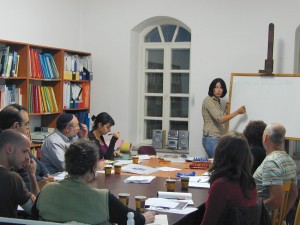Clalit HMO, Kiryat Yovel – adapting clinics to Ethiopian patients – November 6, 2008
Today, a steering committee of Kupat Holim Clalit (the largest Israeli Health Management Organization), the Jerusalem Inter-Cultural Center and the Jerusalem Foundation met for the first time. This committee focuses on cultural competency of the Clalit HMO when serving the Ethiopian community in Jerusalem (read more about this project here).
The meeting took place in the Kiryat Yovel clinic, one of the clinics that serve the Ethiopian community. Representatives of most of the relevant clinics attended, as well as Dr. Sarit Avishay, the medical director of the Clalit HMO Jerusalem district. Many cultural issues and appropriate responses were discussed. In general the first important steps in each clinic include providing Amharic tele-interpretation services (of Tene Briut), conducting trainings to staff, communicating with the local Ethiopian community and assigning staff members as Cultural Competency Officers. It was decided that the JICC staff, together with the Clalit staff, would map the main cultural competency issues. The Kiryat Menahem clinic was suggested as the first clinic to undergo pilot training.
Next week the JICC staff will meet with the Clalit committee head who was assigned to promote the first steps of the process.


